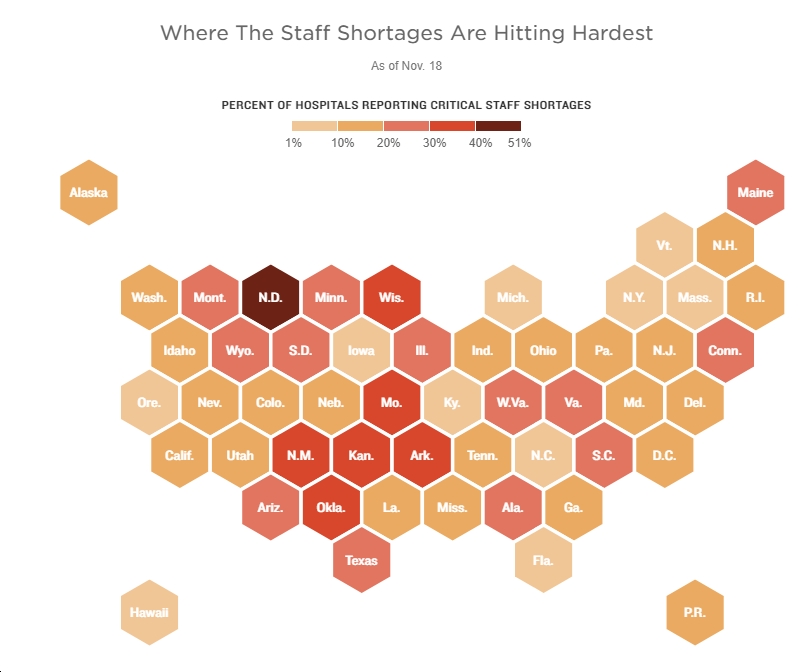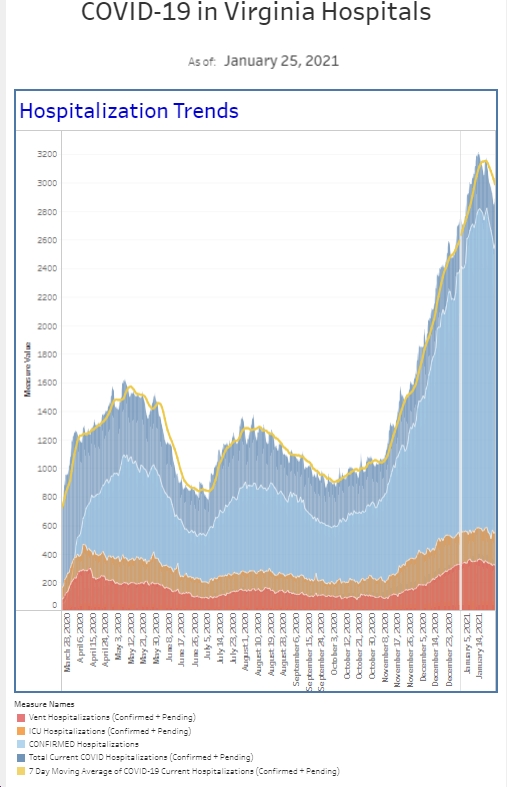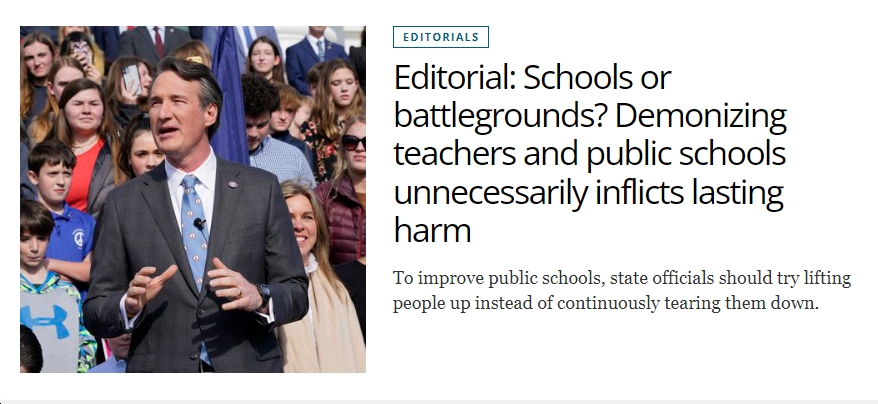See below for the latest “Friday Night Update from the ER in Arlington, VA,” from Dr. Mike Silverman, Chair, Department of Emergency medicine at Virginia Hospital Center. Thanks to Dr. Silverman for doing these; they’re very helpful!
The patient told me he was extremely short of breath and felt like he was going to die. He was healthy and in his mid 30s. He’d been getting worse for about 3 days. He had a cough and was unvaccinated. It is always concerning to me when patients tell me they feel like they’re dying. I think there is a difference between feeling like you so badly like when you have the flu yet knowing you are not going to die (even if you describe yourself as feeling like death) versus a sensation of you actually may die. When patients say this to me, I immediately turn to the monitor and look at the vital signs and the heart rhythm. The respiratory rate was fine, the pulse oximeter was fine, the blood pressure was fine, though the heart rate was a little bit fast at least the heart was carrying electricity normally. There are a handful of things that can kill you quickly and my mind was going through the likelihood that any of them were taking place. A fast heart rate and shortness of breath makes me think about a large pulmonary embolus. It was certainly possible, but both the nurse and I knew within about a minute, this patient had Covid. I did some blood tests and an x-ray, which showed a mild Covid pneumonia. But the blood tests were generally normal, the vital signs normalized with IV fluids, and the patient did not need admission. He told me he could not imagine going home because he was so short of breath and thought he was going to die. There is nothing that indicated this was going to be the case and in fact, we have sent home lots and lots of patient whose oxygen levels were lower, whose heart rates were faster, or were breathing faster. If a healthy guy feels this bad and is essentially begging to stay in the hospital because he’s so afraid of how badly he feels and what might happen, I cannot imagine how short of breath and scared someone must feel whose oxygen level is dangerously low. Later in the shift, I took care of a patient with an acute stroke. The patient was coming in by EMS so we met them in the ambulance door, keeping them on the ambulance stretcher, so we can get them to CT faster. I get about 2 minutes with the patient before they go to CT to assess their history, how likely I think they are having a stroke, do they have contraindications to getting a clot busting medication, and is their stroke big enough where the benefit of the clot busting medication outweighs the risk. The patient goes off the CT while I speak with the neurologist to determine next steps. This particular patient was outside the window for the clot busting medication but was still eligible for an interventional procedure if they had a large vessel occlusion. This was not a tough case and the patient had no symptoms for Covid. However, his screening Covid test did come back positive. These are just two of the many patients we identified as having Covid last week in the emergency department. And yes, I do change some of the details in these cases to protect patient privacy.
After more than a month of increasing Covid numbers among both our symptomatic and asymptomatic patient populations, we actually saw a slight decrease in the new diagnoses that we made this past week. We also saw a slight decrease in the percent positive numbers for each patient category compared to the previous week. We did see a increase in the amount of patients requiring our COVID isolation data but this only resulted in a touch more admissions. I would not say the tides have turned, but certainly having less new cases for a week is better than having more cases. We will see how the next couple of weeks ago. The hospital also has a few less patients with Covid this week than they did the last week. I contrast this with a conversation I had with a good friend from med school who is an ER doc in the South. He describes his patient population as high risk and unvaccinated and primarily what he is doing is taking care of critically ill COVID patients. The ICU’s are full and many patients end up staying in the emergency department for prolonged periods of time. He describes something that I have never seen before. Patients admitted to the floor are getting brought back to the emergency department when they require intubation because there are no ICU beds to upgrade the patient and the hospital floors are not equipped to manage these patients for a long time. He told me they stay in the emergency department until either a bed opens up in the ICU or the patient dies. My friend does not exaggerate, and this is really mind blowing to me about how overwhelmed the medical system is there.
I spoke to three vaccinated friends this week who either recently tested positive for COVID and/or had an immediate vaccinated family member test positive. One was asymptomatic, the other two were officially mildly symptomatic though I think they would say they felt much worse than “mild.” Without high-risk actions, COVID is definitely out and about looking to spread and infect people. Dr Fauci said this week that he is optimistic with vaccinations, the US can get COVID under control by the spring of 2022. We know what we’re doing but we still need to stay focused and vigilant on protecting ourselves.
The FDA approved the Pfizer vaccine this past week. With hundreds of millions of doses given in the US and many fold more than that worldwide, I think it is about time. I realize there is a very thorough and detailed process that all medications and vaccines go through, and I appreciate the scientists who painstakingly dug through the data to give the stamp of approval for what we know. First off, the vaccine is safe. Secondly, the vaccine saves lives and reduces sickness. Side effects from vaccinations typically occur in the first few weeks after people receive the vaccine. It is incredibly rare to have any side effects occur more than 4 to 6 weeks after people receive the vaccine. However, part of the FDA process is that the vaccinated study patients are studied for 6 months to make sure there are no long-term consequences. Many vaccine hesitant people have said they are concerned about potential long-term side effects. Hopefully, having the vaccine get FDA approval will reduce fears of many of the vaccine hesitant people. Is estimated that about 30% of the currently unvaccinated population have said they were waiting on FDA approval to feel better about the safety of the vaccine. I hope that is the case and that a large percentage of the currently unvaccinated patient population are now on their way towards full vaccination.
Besides the stamp of approval, what else does FDA approval mean? Physicians frequently use medications off label. This means a medication may have an indication for one thing but we use it to treat something else. As an ER doc, I use a lot of nausea medicines off label because they are very effective to treat migraines. We also use a gout medication for pericarditis patients and many people have been prescribed a beta blocker (heart medication) to help reduce the fear of giving a presentation (performance anxiety). One of the side effects of certain antidepressants is that it delays ejaculation. It did not take long for psychiatrists and other doctors to use these medications “off label” to treat patients with premature ejaculation. Doctors find lots of uses appropriate for off-label indications that are highly effective and safe. Going back to the Pfizer vaccine, because it’s FDA approved, doctors now have permission to use it off label. Although not recommended, it is possible that it will be prescribed as a booster shot or may be used in pediatric patients under the age of 12. This is not being recommended by medical societies, but it does open the door for off label use. I do not recommend calling your kids pediatrician to ask if they’ll give the vaccine to your <12 year old. The dosing is likely to be very different when the vaccine gets EUA. Probably more important than off label use, is that we will see more and more businesses mandate the vaccine for their employees. We saw the Secretary of Defense mandate it for the US military this week and we’re seeing increasing numbers of businesses mandated for their employees as well. Potentially insurance companies could charge higher premiums for unvaccinated policy holders.
On the other hand, there is a segment of the population that is willing to experiment with an antiparasitic medication called Ivermectin. This medication was really meant to be used by veterinarian’s to treat horses and cows though it is FDA approved and recommended in certain instances by the World Health Organization. Keep in mind, it’s for parasites which are not viruses. There are some doctors who are prescribing it off label. It is, however, not recommended for COVID-19. There have been no studies showing that it works for COVID and in fact, there have been people who have taken this medication and had serious complications. As far back as March, the FDA published an article on the dangers of Ivermectin and why it should not be used off label for COVID-19. Yet there are some people who do not want to follow scientific recommendations and are willing to experiment with medications like Ivermectin. As the surge in the South has increased, more people have turned to Ivermectin. Pre pandemic there were about 3,600 prescriptions a week in the US for Ivermectin. In mid August, that number was 88,000 a week. This led the FDA to Tweet last Saturday, “You are not a horse. You are not a cow. Seriously, you all. Stop it.” A headline from an article earlier this week read: “Mississippi Is Pleading With People To Stop Using A Livestock Drug To Treat COVID-19.” I’ve not seen any patients who have admitted to taking Ivermectin but I suspect it’s happening here as well. Just get the vaccine. It’s safe and effective.
Booster shots are coming. In a recent study by Pfizer with 306 volunteers who received a booster shot between 5 and 8 months after their second shot, antibody levels against the coronavirus increased more than 3 times compared to the second dose. Johnson & Johnson reported this week that a booster shot 6 months after the initial shot led to a 9 fold increase in antibody levels compared to 28 days after the initial shot. Meanwhile, Moderna has completed submission to the FDA requesting full approval of their vaccine. They continue to work on collecting and submitting their booster data as well. And do not be surprised to ultimately see booster shots for all 3 vaccines recommended at the 6-month timeframe in the next few weeks.
My daughter heads back to college tomorrow. She got her flu shot this week (see attached photo). I’ll get mine in the near future. While we’re all focused on COVID boosters, please remember to make a plan to get your flu shot as well.
Science matters. Get vaccinated. Wear a mask. We’re not quite there.
Mike


















